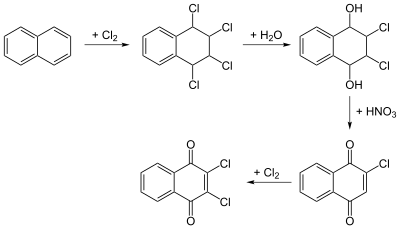Dichlone
Appearance

| |
| Names | |
|---|---|
| Preferred IUPAC name
2,3-Dichloronaphthalene-1,4-dione | |
| Identifiers | |
3D model (JSmol)
|
|
| ECHA InfoCard | 100.003.828 |
PubChem CID
|
|
| UNII | |
CompTox Dashboard (EPA)
|
|
| |
| Properties | |
| C10H4Cl2O2 | |
| Molar mass | 227.04 g·mol−1 |
| Appearance | Yellow crystals[1] |
| Melting point | 193 °C (379 °F; 466 K)[1] |
| 0.1 ppm[1] | |
Except where otherwise noted, data are given for materials in their standard state (at 25 °C [77 °F], 100 kPa).
| |
Dichlone (trade names Phygon and Quintar) is a fungicide and algicide of the quinone class. It is a general use fungicide applied to fruits, vegetables, field crops, ornamentals, and residential and commercial outdoor areas.[1] It is also used to control blue algae.[2]
Dichlone is not persistent in soil and has moderate mammalian toxicity.[2]
Dichlone can be manufactured by the chlorination and oxidation of naphthalene.[3]
References
[edit]- ^ a b c d "Dichlone (Phygon, Quintar) Chemical Profile". Pesticide Management Education Program, Cornell Cooperative Extension.
- ^ a b "Dichlone". Pesticide Properties DataBase, University of Hertfordshire.
- ^ Thomas A. Unger (1996). Pesticide Synthesis Handbook. p. 966. ISBN 0-8155-1853-6.

